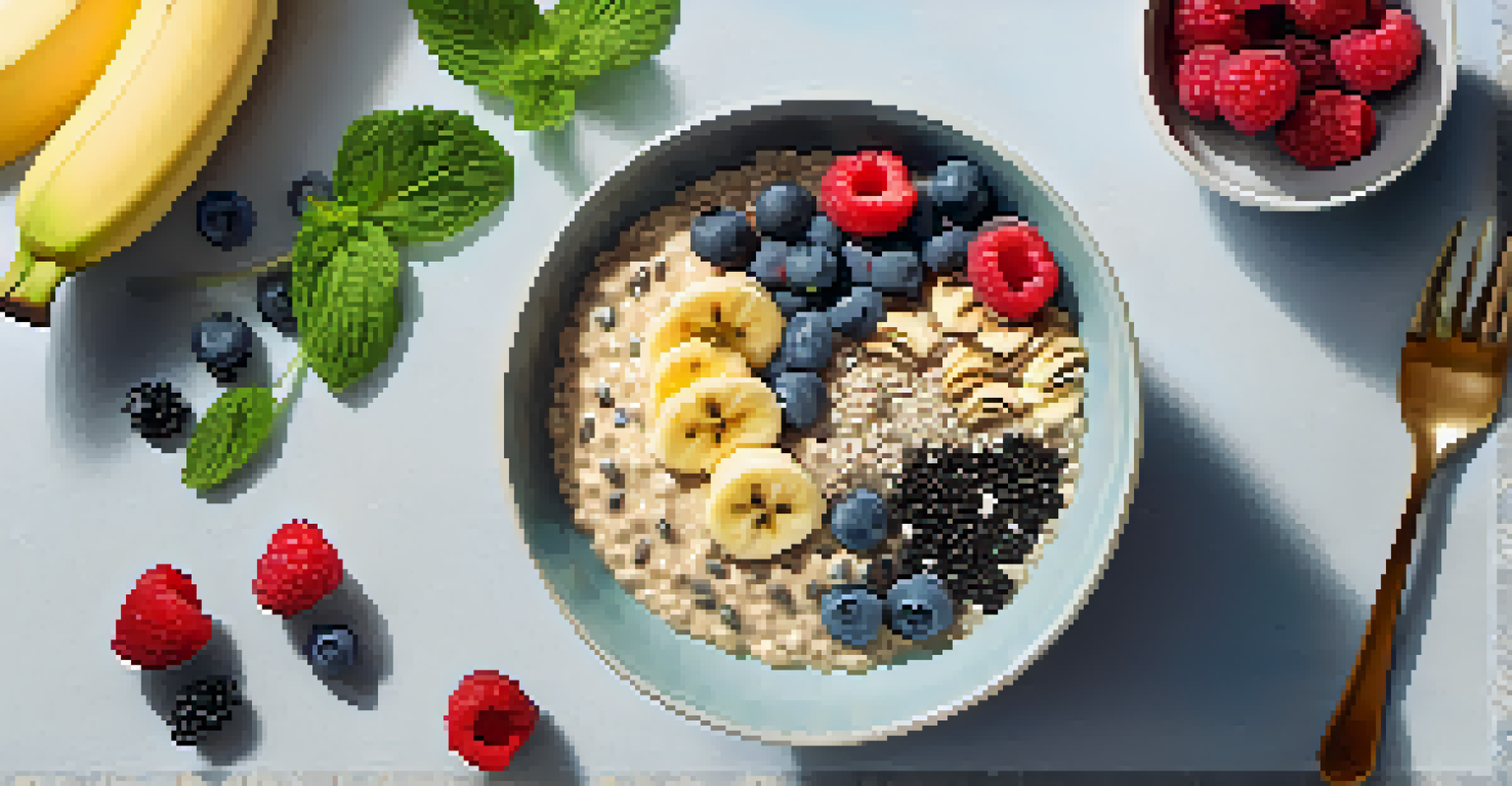Nutritional Facts You Should Share About Vegetarian Diets

Understanding the Basics of Vegetarian Diets
Vegetarian diets primarily focus on plant-based foods, which include fruits, vegetables, grains, nuts, and seeds. Unlike a vegan diet, vegetarians may still consume dairy and eggs, making it a bit more flexible. This approach can offer various health benefits and dietary options, appealing to a wide range of people.
Eating vegetarian is a great way to be healthy and help save the planet.
One of the key advantages of a vegetarian diet is the abundance of nutrients. Foods in this diet are often rich in fiber, vitamins, and minerals, which contribute to overall health and wellness. High-fiber foods help with digestion and can keep you feeling full longer, making it easier to maintain a healthy weight.
Additionally, vegetarian diets are linked to lower risks of chronic diseases, such as heart disease and type 2 diabetes. By focusing on whole, nutrient-dense foods, vegetarians can enjoy a variety of flavors while promoting a healthier lifestyle.
Key Nutrients in a Vegetarian Diet
When adopting a vegetarian diet, it's crucial to ensure you're getting all the necessary nutrients. Some key nutrients to focus on include protein, iron, calcium, and vitamins B12 and D. Incorporating a variety of foods can help meet these nutritional needs without much fuss.

For protein, consider legumes, beans, lentils, and dairy products if you're not vegan. These foods not only offer protein but are also packed with fiber and other essential nutrients. It's a common myth that vegetarians can't get enough protein; in reality, there are plenty of plant-based sources to choose from.
Nutrient-Rich Vegetarian Diet
A vegetarian diet emphasizes plant-based foods that are rich in fiber, vitamins, and minerals, promoting overall health.
Iron is another nutrient that vegetarians should pay attention to. While plant sources of iron, such as spinach and lentils, are available, they're not as easily absorbed by the body as the iron from meat. Pairing these foods with vitamin C-rich options, like citrus fruits, can enhance absorption and help you reach your daily iron needs.
The Importance of Vitamin B12 for Vegetarians
Vitamin B12 is vital for nerve function and the production of DNA and red blood cells. However, this nutrient is primarily found in animal products, making it a concern for vegetarians. Without proper supplementation or fortified foods, deficiencies can occur, leading to fatigue and neurological issues.
Let food be thy medicine and medicine be thy food.
To maintain adequate levels of B12, vegetarians should seek out fortified foods like cereals and plant-based milk. Alternatively, B12 supplements are an effective way to ensure you meet your nutritional requirements. It's essential to regularly monitor B12 levels, especially if you're transitioning to a vegetarian lifestyle.
Being aware of B12 sources can empower vegetarians to maintain their health. By prioritizing these foods or supplements, you can enjoy the benefits of a vegetarian diet without compromising on essential nutrients.
Calcium Sources for Strong Bones
Calcium is crucial for maintaining strong bones and overall skeletal health. While dairy products are well-known sources, vegetarians can find plenty of calcium in plant-based options such as leafy greens, tofu, and fortified plant milks. This diversity ensures that calcium intake remains sufficient.
Incorporating a variety of calcium-rich foods into your daily meals can make a significant difference. For instance, a smoothie with fortified almond milk, spinach, and chia seeds can provide a delicious way to boost your calcium intake while tasting great. Pairing these foods with vitamin D sources can also enhance calcium absorption.
Importance of Key Nutrients
Vegetarians should focus on obtaining essential nutrients like protein, iron, and vitamin B12 to maintain a balanced diet.
By being mindful of calcium sources, vegetarians can maintain bone health. It's essential to focus on variety and balance in your diet to ensure you receive adequate calcium and other vital nutrients.
Healthy Fats and Their Role in a Vegetarian Diet
Healthy fats are an important component of any diet, including vegetarian ones. They support brain health, hormone production, and nutrient absorption. Plant-based sources of healthy fats include avocados, nuts, seeds, and olive oil, which can add flavor and texture to your meals.
Incorporating these healthy fats into your diet can be as simple as topping your salad with walnuts or adding avocado to your toast. These foods not only provide essential fatty acids but also contribute to satiety, helping you feel fuller for longer. Balancing your intake of healthy fats with other macronutrients is key to a well-rounded diet.
Being aware of the types of fats you consume can enhance your vegetarian experience. By choosing healthier options, you can enjoy the benefits while savoring the flavors of plant-based cuisine.
Managing Weight on a Vegetarian Diet
Many people turn to vegetarian diets for weight management and overall health. The abundance of fiber-rich foods can help with weight loss by promoting feelings of fullness and reducing overall caloric intake. A balanced vegetarian diet can be a sustainable way to achieve and maintain a healthy weight.
However, it's essential to make conscious choices about the types of foods you consume. While there are many vegetarian options available, some can be high in calories and low in nutrients, such as processed snacks and sugary beverages. Focusing on whole foods will yield the best results for your health.
Overcoming Dietary Challenges
While adopting a vegetarian diet can be rewarding, individuals may face challenges in meeting nutritional needs and navigating social situations.
Incorporating regular physical activity alongside a well-planned vegetarian diet can further aid weight management. By combining nutritious eating habits with an active lifestyle, you can enjoy the benefits of a vegetarian diet while reaching your weight goals.
Potential Challenges of a Vegetarian Diet
While vegetarian diets can be beneficial, they can also present challenges. For instance, some individuals may struggle with getting enough protein, iron, or other essential nutrients. It’s important to be proactive in planning balanced meals that cover all nutritional bases.
Additionally, social situations and dining out can sometimes pose difficulties for vegetarians. Being mindful of your options and communicating your dietary preferences can help to navigate these situations more smoothly. Many restaurants now offer vegetarian dishes, but it's always good to check menus in advance.

Lastly, some might encounter cravings for certain foods they used to enjoy. Finding satisfying alternatives can make the transition smoother. By discovering new recipes and exploring different ingredients, you can enjoy a fulfilling vegetarian lifestyle.